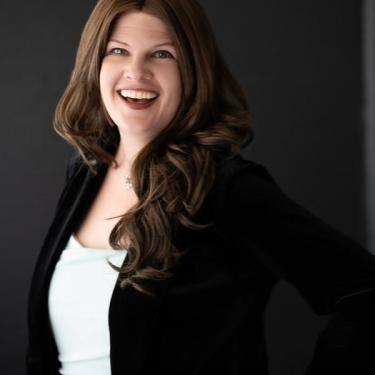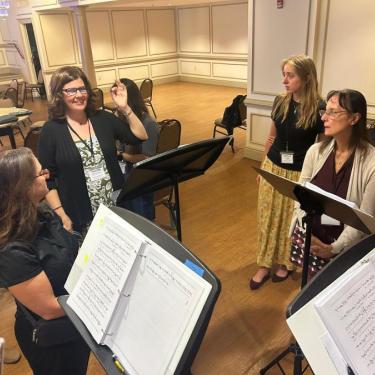
Photini Downie Robinson was a Woman of the Week in 2022, nominated for her work in Byzantine music. We asked her to give us an update on all that she has been up to since then.
At the time of my first WOW interview (2022), I was just beginning to discover the shape and purpose of my ministry. With one foot still planted in the tech industry, I could feel the rhythm of my life starting to shift. As the invitations to teach, write, and speak became more frequent, I entered a time of transition in which I tried it all on to see what fit. Now, three years later, I’m “all in!” I especially enjoy working with ministries in transition. For example, I recently facilitated a workshop in San Francisco where I helped parish musicians navigate the challenges and opportunities of a post-COVID music ministry. This church, like so many others, had a vibrant loft choir for decades. But some have passed away, others have moved on for various reasons. And there is a growing group of chanters who are actively learning. How do you leverage that enthusiasm in ways that honor the past, present, and future? That's something a lot of churches are dealing with, and this is where I see my musical and pastoral training meeting in a critical place. This is sensitive and challenging work, but it can be deeply rewarding for all involved.
Shortly after my last interview, I was formally tonsured into the office of Cantor by His Eminence Gerasimos of San Francisco. A month or two thereafter, our parish Protopsaltis accepted a position out of state so I became the Protopsaltria (first cantor). It was daunting at first; it’s a whole new level of responsibility. I’d been in my happy place as the second in command, helping to fulfill someone else's vision. Now I had to create my own vision. I strove to build upon what our former Protos had already established while figuring out how to make it my own.
Over the past three years, we’ve grown to about 10-15 cantors at a spectrum of skill levels. It was slow to get off the ground, but I remained optimistic. I scaled down my private studio so that I could devote more energy to building a program at my parish. I started with beginner classes for folks who wanted to learn but didn't know where to start. Some of them had musical training, others not so much. I taught the fundamentals of Byzantine scales and notation. I encouraged anyone who was interested to learn and participate. It took some time, because nobody wants to feel too exposed. You start with one or two courageous ones, and then gradually you develop a critical mass so others think, “OK, I can be part of that.” Two or three students emerged as natural leaders, so this summer we did a small intensive where we practiced leadership skills and more advanced repertoire.
In July of 2023, I made my directorial debut with Cappella Romana. It was a great honor to come full circle with the ensemble that first introduced me to the vast world of Orthodox liturgical music. I’ve also been doing a lot of teaching. The past two summers, I taught at the Liturgical Arts Academy in South Carolina. I'm also on the faculty of the Synaxis of Orthodox Women Byzantine Cantors, an annual conference that just held its third gathering in Pittsburgh. More recently, I’ve made the occasional appearance at the Trisagion School of Byzantine Music, serving as a substitute teacher as my schedule allows.
Educational opportunities such as these are becoming much more prevalent. The old model was that you learned at the feet of the master. You went up to the chant stand as a kid and became the apprentice of a skilled mentor. I still think that is the ideal, but many do not have access to such a resource. Today, there are so many excellent learning opportunities online (jurisdictional and pan-jurisdictional schools, group classes and private lessons) and a growing number of regional, national, and international conferences that offer in-person instruction, reinforcement, and networking. With this explosion of interest (driven in no small part by converts to the faith), there is fruitful dialogue emerging about practical topics such as how men and women chant together – either antiphonally or in mixed choirs. Where do we pitch things? How do we experiment together and find compromises so that everyone can chant in a reasonably comfortable range? There is also growing interest in the study of vocal technique and how to produce different colors and timbres in a healthy way. It is very exciting for me to observe this collaborative effort between musicians of diverse backgrounds as they build trust and rapport, gradually forming a cohesive community with shared goals.
In 2022, I was in my second year at the Portland Seminary. Holy Cross doesn’t have an online MDiv program; I still had a teenager at home so moving to Boston wasn’t an option. However, HCHC graciously allowed me to take some online classes and fold them into the MDiv curriculum at my local seminary. When HCHC launched the online MTS program in 2023, I was able to transfer to Holy Cross as a part-time remote student. Now an empty nester, I plan to spend next year on campus as a full-time student and graduate with my MDiv in 2027 (God willing). Next, I hope to return to Portland for a year-long CPE residency at a local hospital so I can prepare to become a Board Certified Chaplain. I would like to work in elder care, especially as pastoral support to families affected by dementia and memory loss. This is fueled in part by my own father who has dementia, and by walking alongside my mother as she navigates the emotional, physical, and spiritual demands of caregiving.
I’m not sure how I will dovetail liturgical music with a chaplaincy career, but I’m not anxious about it. God has opened the right doors at the right time, and I have no doubt that He will continue to guide me on the right path. Ideally, I’d like to find full-time employment in a parish where I could serve in multiple capacities: lead a music ministry, teach in religious education, and assist with pastoral care. But we’ll see what God has in mind!

On a personal note, I continue to mourn the loss of my godfather, Fr. Ivan Moody. He had a profound impact on me, and on so many others. The summer before his repose, my family and I traveled to Portugal to spend time with him and his family. Although I miss him terribly, I’ve had the great privilege of connecting with his wife Susana and their three adult children. Fr. Ivan’s legacy lives on through our collective memory and through the many exquisite compositions he has contributed to the canon of Orthodox choral music. On the flip side, I recently had the great joy of becoming godmother to one of my chant students. Glory to God for all things!
As I look back on the past three years, it’s remarkable to take stock of all the fruit that has blossomed from those early seeds. Part of the journey has been my own musical, spiritual, and academic growth. But I am also thrilled to witness – and participate in – the resurgence of a collective interest in the music, theology, and liturgical practices of our Holy Orthodox Church. May it all be for God’s glory.


